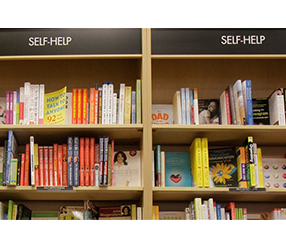Help! The personal development section of my favorite bookstore is expanding faster than the universe. It is a paradox of nature that at the very instant booksellers are vanishing into the dark abyss of unknowingness that self-help titles and tomes are exploding into a big bang of buzz and blather. I am not without guilt having contributed a couple of volumes to the maelstrom myself. Mea culpa, mea culpa! According to recent statistics self-help now even outsells racy romances and bodacious biographies. Can it be that we are even more interested in ourselves than the plastic surgeries and superficial dalliances of our most infamous celebs? While it is virtuous and laudable to do the inside work required to improve our character and circumstances to do so beyond balance and bounds is to become disinterested in the outside work of the world where innovation happens.
The Ancient Greeks liked to create words that cut both ways. With a turn of the phrase these idioms generous with innuendo could both commend and condemn both subject and object. Anyone who has sat through a frolicsome farce by Shakespeare or Molière is familiar with this nasty little linguistic device known as double entendre – a word that has two intended meanings. Omphaloskepsis is just such a word. Taken to mean something akin to contemplating your own navel, omphaloskepsis reveals the comedy of the human condition. It’s a balancing act that even the Flying Wallendas wouldn’t attempt. At one end of the high wire you have self-actualization and self-awareness. At the other end you have self-indulgence and self-aggrandizement. Either way you fall into the troublesome edification that comes with the over examined life of Socrates or fall hopelessly in love with the Narcissus in your mirror. From the looks of things these days it appears that those Ancient Greeks were on to something.
I love self-help books and have enough of them in my library to build the next flammable monstrosity at Burning Man. Thanks to Napoleon Hill, Dale Carnegie and Norman Vincent Peal, I recite my definitive master purpose each morning while being entangled by emails, recall how to win friends and influence people immediately after I’ve said something caustic to an indecorous ignoramus or wonder why my positive thinking is really not all that powerful after all. It is at these moments that I am relieved to remember it’s really not about me. It’s about us. It’s about doing the work that needs to be done to help move our families, friends and communities forward. It’s about being part of something larger than yourself.
The moment you realize that you will never be the person you long to become you experience an irrational sense of freedom. Not the I’m OK, You’re an Eggplant type of freedom that comes from casting off your responsibilities and sliding head first into eternal slackerdom. Rather, the freedom that comes with knowing that you can be more for more people. Our much-maligned ego is the reason we innovate. It is the spark that jumps from the internal fire of creativity to our external world where desire and dissatisfaction are the dry tinder. Our ambition sets the world afire for better or worse. Without it no craft takes flight, no disease is cured and nothing grows including us.
Maybe Gandhi had it backwards when he said, “Be the change that you wish to see in the world.” Perhaps “Create the world you wish to see” would be a more apt description of the innovator’s creed. The life of Benjamin Franklin illustrates this point. From penniless runaway apprentice to founding father, Franklin moved through many lives in succession – author, printer, politician, postmaster, scientist, inventor, activist, statesman, and diplomat. Early on he absolved himself of his imperfections and abandoned wholeness altogether. For example, it didn’t seem to bother him that he was an abject failure as a husband and father. Exquisitely incomplete he was pulled forward to the next potentially fulfilling endeavor. His sense of ennui turned his private contemplations into our public creations. Poor Richard himself cautioned that self-loving can easily become self-centered. Innovators innovate looking out into the world well beyond their navels.
Curiously, the only publishing category growing as quickly as the self-help book is its evil twin the blame-others genre. That’s the one where all your problems are the fault of someone else. I suspect the Ancients had a word for this as well but then again it’s all Greek to me.
